Linking Prostate Care, Childhood Cancer & Renal Safety: Insights for Ghanaian Health Systems
As Ghana marks Prostate Cancer Month and Childhood Cancer awareness, there is a significant opportunity for health systems and professionals to respond more effectively. Intersection of cancer care and kidney health is often under-emphasised, yet vital. This post outlines why that link matters, what current gaps may exist, and how better supplies and logistics support can improve outcomes.
Why the Connection Matters
- Several cancer therapies, especially in children (e.g., high-dose chemotherapy, radiotherapy) and in older men (e.g., hormonal therapy for prostate cancer), have side-effects that can compromise renal function.
- Prostate enlargement or obstruction can affect urinary flow and thereby stress kidneys. Untreated urinary retention or infection can lead to hydronephrosis or pyelonephritis.
Gaps in Ghanaian Practice & Infrastructure
- In many clinics, there is irregular availability of high-quality diagnostic tools and consumables (e.g., sterile catheters, gels, meatal catheters). This increases risk of infection and procedural complications.
- Renal monitoring (eGFR, creatinine, urine protein) may not always be routine due to cost, lab access, or supply issues.
- Public awareness tends to treat childhood cancers and prostate cancer in isolation, but there is little messaging about renal implications or preventive care.
Opportunities & Best Practices
- Screening programmes: using PSA, DREs for men; and for children, training primary health workers to spot early signs. Early engagement means treatment is safer, less taxing on kidneys.
- Use of high-quality catheterisation equipment and lubricants/gels: ensure minimal trauma, reduce infection, and preserve urinary tract integrity. Products that are latex-safe, hypoallergenic, and sterile make a big difference.
- Multidisciplinary clinics: where urology, oncology, nephrology intersect, especially in larger hospitals. Better coordination of care means fewer surprises (e.g. renal failure) during treatment.
Strengthening the Supply Chain & Product Access
- Distributor partners must ensure quality and authenticity of products: sterile gels, lubricants, catheters, diagnostic strips etc.
- Suppliers should also maintain cold chain (if any), proper storage, reliability so that clinicians can plan treatments without fear of stock outs.
- Institutional investment in products that improve patient comfort and reduce complications: e.g., water-based gels vs oil-based, better catheter designs that reduce meatal trauma, more comfortable catheter types for paediatric patients.
Policy & Education
- Ministry of Health, Ghana Health Service, medical schools: include renal risk in cancer treatment curricula.
- Awareness campaigns in prostate cancer and childhood cancer months that also include kidney health tips: hydration, recognising signs, avoiding unnecessary nephrotoxins, making sure procedures are done with safe materials.
- Research and data collection: track incidence of renal impairment among cancer patients, especially children and prostate cancer patients, to guide resource allocation.
Medical institutions, clinics, and individual practitioners are encouraged to assess their current supply of sterile consumables, lubricants, and diagnostic tools. Ensure you are using products that protect kidney function as part of cancer care. Together, we can build safer clinical pathways.
Visit www.nrmeds.com to review clinical-grade supplies designed for safety and quality.
#CancerAndKidneys #ProstateAwareness #PaediatricOncology #RenalSafety #MedicalSupplyChain #QualityHealthcareGhana #Oncologists #Urologists #HealthcareInnovation










